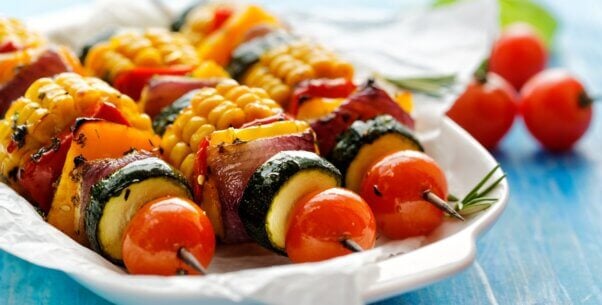From ekathimerini.com
By Duncan Howitt-Marshall
As Lent approaches, we explore Greece’s surprisingly rich plant-based cuisine – and what it’s really like going animal-product free for 40 days
Mention “vegan food” and “Greece” in the same sentence, and you’ll often get a raised eyebrow. For many people abroad, Greek cuisine begins and ends with souvlaki, grilled lamb, and cheese in heroic quantities. When I first moved to Athens in 2010 as a card-carrying vegetarian, friends back home were genuinely concerned. “What are you going to eat?” they fretted, as if I were heading into some culinary wilderness where meat skewers roamed free and vegetables were rare sightings.
The reality, of course, is very different. I quickly discovered that Greece is one of the easiest places in Europe to eat well without meat. Even before you get to the myriad salads and vegetable meze, there are beans stewed in tomato sauce, lentil soups that feel like a bear hug in winter, trays of oven-roasted vegetables swimming in olive oil, “horta” (wild greens) braised and dressed with lemon, and a whole host of other meatless delights. Throw in the cheeses and the rich, creamy yogurts and, for a vegetarian at least, life is good. Really good.
But what about going fully animal product-free? What’s it really like to be vegan in Greece – not just as a visitor passing through a handful of hip neighbourhoods, but as someone trying to live, eat, and order off menus in restaurants and tavernas?
As Lent approaches and the fasting period known in Greek as “nistia” kicks in, it’s a good moment to look again at how veganism fits into Greek food culture. Because here’s the twist: for 40 days every year, Greece quietly turns into one of the most vegan-friendly places on the planet – without ever calling it that.
The secret vegan season: ‘Nistia’
If you’ve ever visited Greece in the run-up to Orthodox Easter, you may have noticed a curious thing on menus: dishes marked “nistisimo.” This label means they’re suitable for fasting. During the six-week period from Clean Monday to Easter, many Greeks avoid meat, dairy, and eggs. On Wednesdays and Fridays, even olive oil is off the table. What’s left is a naturally vegan cuisine rooted in beans, vegetables, and grains – dishes that have been part of everyday life for centuries.
In practice, this means that tavernas, bakeries, and home kitchens already know how to cook food that happens to be vegan. No one is reinventing the wheel. “Fasolada” (white bean soup) doesn’t suddenly become fashionable because someone put a leaf icon next to it on a menu. It’s just what people have always eaten when fasting. The same goes for “fakes” (lentil soup), “gigantes” (giant baked beans), “dolmadakia” (stuffed vine leaves) without meat, “briam” (vegetable casserole), and “fava” (a creamy purée of yellow split peas).
For anyone curious about trying a vegan diet, “nistia” is like a built-in safety net. You can walk into a perfectly ordinary neighbourhood taverna, ask what’s fasting-friendly – with the magic phrase “nistisimo einai?” – and be met with a list of dishes that are already tried, tested, and satisfying, including a whole category of naturally plant-based food called “ladera” (vegetables cooked in olive oil). These hearty dishes sit quietly on the menu, overshadowed by fancy grills and roasts, but once you start looking for them, they’re everywhere. No awkward substitutions, no eye-rolling from the kitchen. You’re just eating food that happens to fit the rules of the season.
Besides, eating this way changes how you order. Instead of a main and a couple of sides, you end up sharing a “pikilia” (assortment) of small dishes, dipping bread into sauces, discovering flavours you might otherwise skip in favour of something meaty. It’s a slower, more social, more Greek way of eating.
To learn more about the delicious vegan food options served throughout the year at just about every taverna in Greece, click here.
A vegan twist on a Greek classic: meat-free souvlaki, using jackfruit. [Shutterstock]
Not just a fad: Greece and the global vegan boom
This isn’t just anecdotal. According to recent findings by the UK-based Vegan Society, Greece ranks among the world’s top countries for vegan dining options per capita – 218.12 vegan dining options per million people, placing it tenth worldwide. That’s a pretty impressive statistic, especially when you consider that only two percent of Greeks identify as vegan and four percent as vegetarian – figures comparable to Germany, the UK, and the US.
You could argue that part of this is down to tourism. Visitors increasingly expect plant-based options, and restaurants have adapted. Another part of it is down to urban food culture, with vegan cafés and bakeries opening in Athens, Thessaloniki, and other cities. Drawing on 2025 data from restaurant platform HappyCow, Greece records 2,260 vegan dining listings, according to the Veganism Around the World 2025 report – on par with Sweden.
But the main reason comes from the fact that Greek cuisine already had a deep repertoire of animal product-free dishes long before anyone started using the word “vegan” – a term that was first coined in 1944 by animal-rights advocates Donald and Dorothy Watson, co-founders of The Vegan Society.
In other words, the country didn’t need to invent a new way of eating to accommodate the trend. It just had to dust off what was already there, and in some cases, repackage it for a new, more ethically conscious audience.
‘We’ll make you lamb’: Old assumptions die hard
Still, cultural habits die hard. There’s a wonderful line in the 2002 rom com “My Big Fat Greek Wedding” that captures the generational mindset perfectly. When the deliciously theatrical Greek Aunt Voula hears that the non-Greek fiancé Ian Miller “don’t eat meat” – cue shocked looks from the extended family – she beams: “That’s okay. I make lamb.”
If you’ve spent any time around older Greeks, you’ll recognize this logic. The idea of not eating meat can feel a bit … counterintuitive. Food is love here, and love is often expressed through generous portions of whatever the cook considers “proper” food. For many people of the Golden Generation – those who experienced extreme hardship and famine during World War II and its immediate aftermath – that still means meat on the table.
And yet, there’s a funny moment that often follows these conversations. You explain that you don’t eat animal products. Someone frowns, shakes their head, and says it must be impossible in Greece. Then, a few minutes later, they start listing what you can eat. “Fasolakia” (green beans). “Arakas” (green pea stew). “Spanakorizo” (spinach and rice). Okra in tomato sauce. Fried zucchini. “Imam Bayildi” (baked eggplants with tomato and olive oil. “Gemista” (stuffed vegetables – usually tomatoes and/or peppers) – without mince. At some point, it dawns on everyone in the room that they’ve been cooking vegan food their whole lives – they just never thought of it that way.
Not a new idea: Plant-based eating in ancient Greece
The idea that avoiding animal products is some modern import doesn’t hold up well when you scratch away at Greece’s ancient history. Long before the birth of Christianity, certain philosophical and religious groups promoted forms of veganism based on the grounds of social justice and ethics. The followers of the Greek mathematician and philosopher Pythagoras (c. 570-495 BC), for example, believed that eating animals was morally problematic, tied to ideas about the soul and reincarnation. The Pythagoreans also shunned the sacrifice of animals and the ritual offering of meat to the gods, believing it was unnecessary to inflict pain and suffering on another sentient being.
A similar group, the Orphics, who based their beliefs around the myth of Dionysus, also practiced dietary restrictions as part of a wider spiritual worldview. An ascetic sect based on the mythical poet Orpheus, whose views mirrored elements of Pythagoreanism, adhered to a strict vegetarian diet that even excluded broad beans, believing they contained the souls of the dead.
Of course, this doesn’t mean ancient Greeks were vegans in the modern sense. However, it does mean that debates about what humans should or shouldn’t eat are hardly new here. The tension between indulgence and restraint, between feasting and fasting, runs through Greek culture from antiquity to Orthodox Christianity and into the present day.
Seen in that light, today’s interest in veganism feels less like a radical break and more like another turn of a very old conversation.
Plant-based alternatives to meat, cheese, yogurt and milk are becoming increasingly available at Greek supermarkets. [Shutterstock]
Supermarkets have changed (a lot)
One area where things really have shifted in the last decade is the supermarket aisle. When I first arrived in Greece, finding anything labeled “vegan” felt like a small victory. Things like tahini, humus, pasta, and legumes in all their glorious forms were easy, of course, but anything resembling a plant-based alternative to cheese, yogurt, or milk was rare.
That’s no longer the case. Oat milk, almond milk, soy yogurt, vegan spreads, and items like tofu and soya burgers have become part of the mainstream grocery shop, especially in cities. Some of these products feel a bit imported in spirit – think meatless deli slices and substitute bacon (aka “facon”) – borrowing more from northern European food trends than Greek ones. Others are simply modern takes on ingredients that Greeks already love, like chickpeas, lentils, mushrooms, and sesame.
What’s interesting is how these newer products sit alongside the traditional fasting foods. A packet of vegan “feta” might catch your eye, but right next to it are a whole host of legumes that your yiayia would recognize instantly. One feels like a trend. The other feels like continuity.
Click here to find out more about the various ranges of vegan products in Greece.
Fresh fruits and vegetables galore. If you want to try veganism in Greece, even just for 40 days, you’re spoilt for choice. [Shutterstock]
So, is Greece a good place to be vegan?
The honest answer is yes – albeit with a small caveat. Greece isn’t uniformly vegan-friendly in the way that some northern European capitals now are. You won’t always find a dedicated plant-based menu in a mountain village, and you may still get the occasional confused look if you explain that you don’t eat cheese. But you will almost always find something good to eat, especially if you’re willing to meet the cuisine where it already is.
There’s something quietly refreshing about eating vegan food in a culture that doesn’t feel the need to label everything. During “nistia,” plant-based dishes aren’t marketed as lifestyle choices or moral statements. They’re just part of the rhythm of the year, deeply rooted in Greece’s Orthodox Christian heritage. You eat this way for a while, then you don’t. The food remains.
Maybe that’s the real lesson here. Veganism in Greece doesn’t have to be a conspicuous display of identity. It can simply be a way of eating that fits, comfortably, into traditions that are older than the word itself.
So, whether you’re vegan for life, for Lent, or just curious about trying something different at the taverna, Greece is a surprisingly easy place to do it well.
Kali Sarakosti.
https://www.ekathimerini.com/leisure/gastronomy/1296259/veganism-in-greece-whats-it-really-like-during-nistia/












